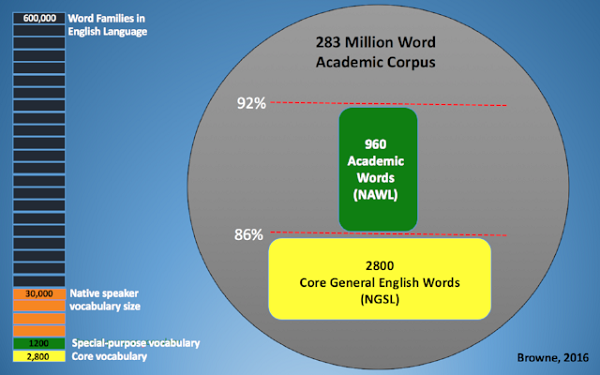- MN ABE Connect
- Archive
- Introducing the New Academic Word List
 February 5, 2018
February 5, 2018
Introducing the New Academic Word List
Kristine Kelly, Literacy & ELA CoordinatorFor several years, we have referred to the Academic Word List compiled by Averil Coxhead as a list of academic vocabulary important to teach ABE students and ELLs. The list of Tier 2 words is referred to in STAR and EBRI trainings, CCRS trainings, and in other MN professional development that incorporates the topic of teaching academic language.
Now I’d like to introduce you to the New Academic Word List (NAWL). This list updates the collection of academic vocabulary to include 963 high-frequency words that appear in academic text and oral discourse. The new list shares approximately 21% of the word families with the previous Academic Word List.

When looking through the new list for the first time, I was struck by how many of the new words reflect current events text we often read in my class:
|
|
|
Academic vocabulary is clearly important for college and career readiness. But what about our learners who have no college plans? News programs, magazines, school and employer communications, television and movies, the documents adults deal with in everyday life – we want our students to be able to understand what they hear and read and have a solid foundation to build new learning. We want them to engage meaningfully in a variety of contexts.
In the College & Career Readiness ELA standards, the shift of complexity includes academic language instruction. It is not enough for texts we use with students to contain academic language. We must also explicitly teach academic language through direct instruction and provide tasks that help our learners to incorporate these words into speaking and writing and to analyze them in a variety of texts.
When teaching with complex text, we can draw students’ attention to language by including text dependent questions based on the CCRS Language standards along with questions that target CCRS Reading standards:
- Can you restate sentence ___ using more precise words? (Language Anchor #3)
- What does the word/phrase ___ mean in this text? Support this with evidence from other lines in the text. (Language Anchor #4)
- Without changing the meaning of sentence ___, which other word/phrase could be used to replace the underlined part? (Language Anchor #4)
- Which of the following synonyms is closest in meaning to the word ___? (Language Anchor #5)
- In what other contexts have you seen the word(s) ___? Is the meaning different in these other texts? (Language Anchor #6)
Keep the following criteria in mind when designing lessons and choosing resources that include vocabulary instruction:
- Our instruction should focus on explicitly building students’ academic vocabulary and syntax
- Questions and tasks should support students in analyzing the academic language (vocabulary and syntax) in passages.
- The words we focus on should be key to understanding the specific text.
The NAWL provides some exciting new high-frequency academic words for us to dig into with our students! When we provide academic vocabulary instruction with multiple opportunities for students to wrestle with and practice using this vocabulary, we empower our students in their roles as lifelong learners, employees, parents, community members, advocates, and participants in the everyday systems of life.
Check out the NAWL website and be on the lookout for new materials and tools to be developed that incorporate this new list. And don’t forget to go to the Vocabulary section of the ATLAS Reading resource library for some terrific resources about teaching vocabulary.
Newsletter Signup
Get MN ABE Connect—the official source for ABE events, activities, and resources!
Sign UpArticle Categories
- ABE Foundations/Staff Onboarding
- ACES/Transitions
- Adult Career Pathways
- Assessment
- CCR Standards
- Citizenship
- COVID-19
- Cultural Competency
- Digital Literacy/Northstar
- Disabilities
- Distance Learning/Education
- ELA
- Equity/Inclusion
- ESL
- HSE/Adult Diploma
- Listening
- Math/Numeracy
- Mental Health
- Minnesota ABE
- One-Room Schoolhouse/Multilevel
- Professional Development
- Program Management
- Reading
- Remote Instruction
- Science
- Social Studies
- Speaking/Conversation
- Support Services
- Teaching Strategies
- Technology
- Uncategorized
- Volunteers/Tutors
- Writing